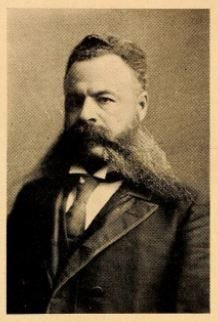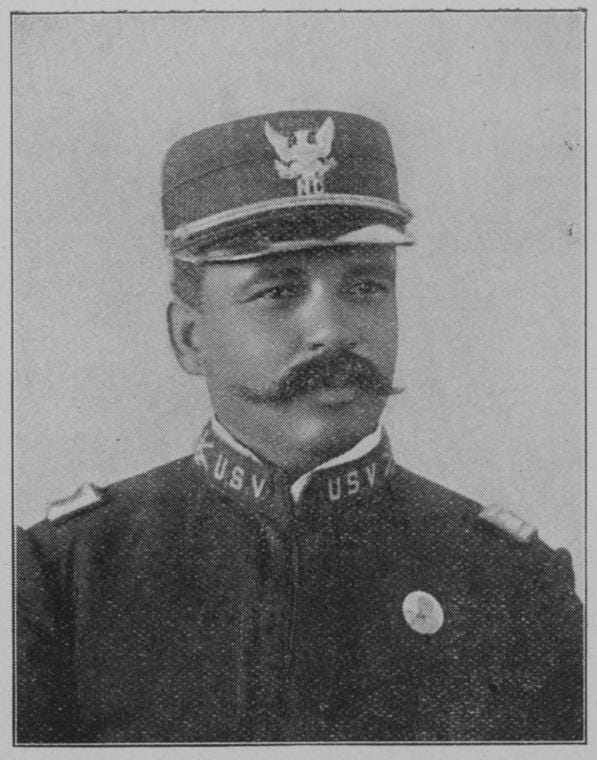More tales of North Carolina's 19th-century African American legislators
Part 2: Schoolteachers, journalists ...
Last time, I introduced readers to a handful of African American legislators elected to the North Carolina General Assembly during the nineteenth century, among more than 125 black state legislators, all Republicans, who held office between 1868 and 1900. Building on my decades of research into the life of George Henry White, who served in the 1881 and 1885 sessions, I am continuing my occasional series on obscure state legislators representing more than a dozen state counties during the period.
Most of the legislators were well educated, often attending or graduating from historically black colleges and universities (HBCUs), including Shaw University, Lincoln University of Pennsylvania, and Howard University, and became physicians, schoolteachers, ministers, and journalists. A few were self-educated, but despite a lack of formal training, still managed to rise to positions of influence and respect in the African American community.
Following are brief biographies of four more of those legislators, some of whom I have written about at greater length in other venues, including in my 2001 biography, George Henry White: An Even Chance in the Race of Life (LSU Press), and in other books and published articles.
Schoolteachers:
Lewis T. Christmas served in 1879 N.C. General Assembly
Rev. Lewis Thomas Christmas (1855-1928) was born November 4, 1855, in Warren County, a son of Rev. Marcus G. Christmas and Henrietta Christmas. He was educated in the Warren County common schools and attended Shaw University between 1875 and 1882.
Beginning in about 1874, Christmas was a schoolteacher in Warren and Granville counties, and may also have served briefly as principal of the Warrenton training school. In Warrenton, he became active in Republican party politics, and was nominated to represent Warren County in the state House of Representatives in 1878. Elected that fall by a 1,300-vote majority, he served one term in the N.C. House during the 1879 session of the General Assembly, as one of 16 black members. Rep. Christmas served on three committees: Incorporations; Deaf, Dumb and Blind Asylum; and Counties, Cities, Towns, and Townships.
Christmas was then selected as an alternate state delegate at large to the G.O.P. national convention of 1880. After teaching at the New Bern Normal School in 1883, he moved to Raleigh; by 1900, he had also become a Baptist minister. His first wife was Susan Rene Falcon, who died by 1884. His second wife was Mary M. Smith-Christmas, to whom he was married in February 1885. Their daughter, Catherine Weatherford (1908-1936), was his only child.
Christmas died in Wake County in June 1928. He is buried in Raleigh’s Mount Hope Cemetery. His widow died in Wake County in 1942.
Noah R. Newby (1857-1899?) was born on June 15, 1857, in Perquimans County, the son of Marcus and Henrietta Newby of Nixonton Township. A farmer, he became a schoolteacher after being educated at Hampton Institute, where he matriculated in the Class of 1879 but did not graduate. But he taught nonetheless at Nixonton for three years; Deep Branch and Okisco, for one year each; and in Elizabeth City, for five years.
While living in Pasquotank County, he became active in Republican party politics. In 1882 he was nominated by county Republicans as one of two representatives to the N.C. House, and elected by a small majority on 217 votes. In the 1883 session of the General Assembly, he was one of 19 black members, and served on the Education and Fishing Interests committees.
Newby worked briefly in the 1890s as first assistant to Rooks Turner, a Howard University graduate and teacher at the Elizabeth City normal school (now Elizabeth City State University). His biographical sketch appeared in the 1893 book, Twenty-Two Years Work of the Hampton Normal and Agricultural Institute at Hampton, Virginia.
In 1893, he married Mary J. Burrell of Washington, D.C., where he is presumed to have moved soon afterward. Newby’s death date and place of interment are not known, but he is presumed to have died in early 1899 in Washington, D.C., where she was listed as a widow in the 1899 city directory.
* * * * * * *
Col. James Hunter Young of Raleigh, who served in N.C. General Assembly, 1895-1897. Public domain
Journalists:
James Hunter Young (1858-1921) was born on October 26, 1858, to an enslaved mother and a prominent white man, never identified, in Henderson. He was first educated in the Granville County common schools, and then studied at Raleigh’s Shaw University between 1875 and 1882; he briefly studied medicine there.
From 1877 to 1885, he worked as a clerk for Col. J. J. Young, internal revenue collector for North Carolina’s 4th district, and from 1886 to 1889, as chief clerk, Wake County Register of Deeds. In Raleigh, he also became active in Republican party politics, and served on the Raleigh city council from 1883 to 1884. He was selected by the state’s Republican party as an alternate statewide delegate at large to the 1884 national convention.
In 1889, he became U.S. special collector of customs on Wilmington, and from 1890 to 1893, served as collector of the port of Wilmington during the administration of President Benjamin Harrison. While living in New Hanover County in 1892, he was chosen as a delegate from the sixth congressional district to the GOP national convention in Minneapolis, which renominated President Harrison.
Upon his return to Raleigh, Young became editor of the Raleigh Gazette, North Carolina’s most influential black weekly newspaper. In 1894, he was elected to the first of two terms in N.C. House of Representatives from Wake County as a Republican; he was renominated and reelected in 1896. His 1895 and 1897 committee assignments included Judiciary; Finance; Privileges and Elections; Printing; Education; Election Law and County Government. He also served on a special Joint Committee to nominate trustees for the Agricultural and Mechanical College for the Colored Race (at Greensboro, now N. C. A&T State University).
In 1897, he became a confidant and advisor to Republican Governor Daniel Russell, who was elected in 1896. After leaving the General Assembly, Young became the state’s chief fertilizer inspector, and in 1898, was commissioned as colonel of a regiment of black volunteers during the Spanish-American War. After the war’s end, he was appointed by President William McKinley as deputy U.S. revenue collector for the Raleigh district in 1899, and served in that capacity until 1913. Despite the state’s restrictive new suffrage laws, Young remained extremely active in the N.C. Republican party.
He was married first to Bettie Ellison Young, daughter of former state legislator Stewart Ellison; she bore him two daughters, Maude E. Young Ray and Martha Young. After Bettie Young’s death in 1907, he was married to a widow, Mary Young, and then in 1913, to Lula Evans Young of Raleigh, who survived him. James H. Young died on April 11, 1921, in Raleigh, and is buried in that city’s Mount Hope Cemetery.
George Allen Mebane (1850-1901) was born July 4, 1850, at Hermitage, Bertie County, to enslaved parents who fled to McKean County, Pennsylvania, after the Civil War broke out in 1861. As a teenager, he became a mess boy in Company A, 85th New York Regimental Volunteers. He was educated in the common schools of Pennsylvania.
After the War ended, Mebane returned to North Carolina, where he taught school, maintained a provisions store, and became an editor of the Carolina Enterprise newspaper in Goldsboro in 1881. In the 1890s, he acted as an incorporator/financial agent/general superintendent for the Elizabeth City Colored Normal School and Industrial Institute (now Elizabeth City State University).
He also became active in Republican party politics, and was while living in Windsor in 1876, was selected as the party’s nominee to represent the Third District (Northampton and Bertie counties) in the N.C. Senate from the 3rd District (Northampton–Bertie counties). After his subsequent election by a substantial majority of 2,161 votes, he served on the Senate’s Education and Corporations committees, as one of five black senators in the 1876-1877 General Assembly. In 1882, he was renominated and reelected from the same district, by a smaller majority of 1,200 votes, and served as one of three black senators in the 1883 General Assembly.
In about 1884, Mebane was elected register of deeds for Bertie County. An unsuccessful candidate in 1888 for the G.O.P. nomination for Congress from the Second Congressional District, he then ran as an independent Republican candidate against the party’s successful nominee, Henry Plummer Cheatham.
In February 1877, Mebane was married to Jennie M. Sanderlin; they had at least three children, including one son, Francis Howard Mebane (1892-1974), and one daughter, Hattye Mebane Tillett (b. 1887, Elizabeth City).
Mebane died on October 12, 1901. His place of interment is not known. His widow was still living in Elizabeth City in 1910, according to that year’s U.S. census.
Next time: More tales of North Carolina’s 19th-century African American legislators





